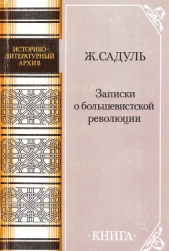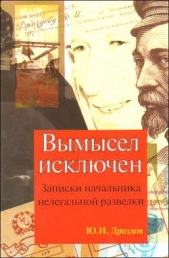Записки социалиста-революционера (Книга 1)

Записки социалиста-революционера (Книга 1) читать книгу онлайн
Внимание! Книга может содержать контент только для совершеннолетних. Для несовершеннолетних чтение данного контента СТРОГО ЗАПРЕЩЕНО! Если в книге присутствует наличие пропаганды ЛГБТ и другого, запрещенного контента - просьба написать на почту [email protected] для удаления материала
Наш разговор оборвался; другого, вопреки тому, что было условленно, по случайным причинам не состоялось. В Михайловском меня поразила какая-то усталость и как бы надтреснутость. Свидание не дало мне того, чего я ожидал. И долго меня точило сознание чего-то мною в Петербурге недоделанного. Но с тем же, нисколько непоколебленным оптимизмом счастливой привилегией юности - я перебрался через рубеж, отделяющий нашу застойную, самодержавную и православную Русь, от шумных и кипучих центров Западной культуры. Это для меня было скачком в загадочное неизвестное. Сколько было в нем притягательного и многообещающего!
Oriental Research Partners MEMOIR SERIES
General Editor: Professor Marc Raeff Columbia University
VIKTOR CHERNOV ZAPISKI SOTSIALISTA-REVOLIUTSIONERA
Berlin, 1922
NEW INTRODUCTION BY CONSTANTINE BRANCOVAN, REPUBLISHED BY ORIENTAL RESEARCH PARTNERS, 1975
Oriental Research Partners wish to thank
Yale University Library for the use of their book for
reprinting purposes.
Republished 1975 by Oriental Research Partners, Box 68 Cambridge
Reprinted in Great Britain by Kingprint Limited, Richmond, Surrey
NOTE FROM ORIENTAL RESEARCH PARTNERS The regular introduction to Chernov's memoirs should have been written by Constantine Brancovan. Unfortunately, Mr. Brancovan has been inexplicably unable to fulfill his contract and has been replaced at the eleventh hour. This late change has meant that our normal introduction is somewhat shorter than planned. We do hope, however, that this inconvenience will not detract from the reading of Chernov's fascinating memoirs.
VIKTOR MIKHAILOVICH CHERNOV (1873-1952) was a Russian politician and theoretician of the Social Revolutionary Party. During the 1890's he led the Populist groups away from a programme of anarchism, violence, and despair into a closer harmony with the new problems facing Russia at the turn of the century-urbanization, Marxism and industrialization. He played an important part from 1901 to 1906 in several congresses of the Populist groups in the formation of the Social Revolutionary Party, of whose Central Committee he became a member. He insisted that unity would have to be superimposed on the revolutionary movement so that 'we will not have social democrats and social revolutionaries, but one indivisible party'. He persuaded his fellow party members to accept the existence of an industrial proletariat in Russia and of its revolutionary role alongside the peasantry. He also succeeded in forming an agrarian policy which was summarized in the slogan 'the land belongs to no one and labour alone confers the right to use it'. He returned to Russia in April 1917, having been in exile abroad since 1899, and in May he joined Kerensky's Provisional government as minister of Agriculture. But his long sojourn out of Russia had a disastrous influence on his position as minister. As the leader of the largest socialist party, his position should have been one of commanding strength, but was in fact, one of increasing weakness, partly because his land policy, based to a certain extent on the military pressures of the time, forced him to prevent the peasants from seizing the land as their own. His declining hold over the masses was shown in July 1917 when he was saved by Trotsky from the hands of an angry crowd. He resigned from the Provisional government in September 1917. He was powerless to prevent the seizure of power by the Bolsheviks. In the meaningless elections held just after the Revolution, as leader of the majority party, he was elected chairman of the Constituent Assembly and it was characteristic of his temperament that he insisted that the demonstration against the dispersal of the assembly should be unarmed. The tactics completely failed and in 1920 he left Russia once again.
He spent several years with the large Russian emigre community in Prague.
He wrote a great deal on the revolution of which the best known is The Great Russian Revolution (1936). He died in 1952 leaving a large number of friends and sympathizers in both Europe and North America.
References * Bibliographical Information
The source of the whole Populist movement in nineteenth Century Russia
is best described in Franco Venturii, Roots of Revolution, (New York, 1960, paperback, 1966).
On Chernov see:
Randall, F.B., "The major prophets of Russian peasant socialism:
A study in the social thought of N.K. Mikhailovskii and V.M. Chernov",
Ph.Dthesis, Columbia University, 1961. Bibliography, ff 272-289.
Savinkov, B.V., (1879-1925). Postmertnye stat'i i pis'ma, Moscow, 1926.
Tseretelli, I. G., "Rossiiskoe krest'yanstvo i E.M. Chernov v 1917 g".
Novii zhurnal, N.Y. 1952, XXIX, 213-44.
On the Social Revolutionaries and Chernov, see ample bibliographic material in two books by Oliver Radkey, The Agrarian Foes of Bolshevism: Promise and Default ot the Russian Socialist Revolutionaries, Feb to Oct 1917, (Columbia University Press, N.Y, 1958), The Sickle under the Hammer, the Russia Socialist Revolutionaries in the Early Months of Soviet Rule,(Columbia University Press, 1963), and
D. Treadgold, Lenin and His Rivals: the struggle for Russia's Future, 1898-1906, (London, 1953)
The ideological pre-history is treated in Arthur P. Mendel, Dilemmas of Progress in Tsarist Russia; Legal Marxism and Legal Populism, (Cambridge, Mass., 1961).
A collection of Chernov's papers may be consulted in the Hoover Library,
Stanford University, California.
Philip Clendenning, Queens' College, Cambridge, May 1975.
LIST OF CHERNOV'S WORKS
Zapiski sotsialista revoliutsionera , Berlin, 1922, Kn.I. NO MORE PUBLISHED.
Sobranie sochinenii . vyp . 1-2 Petroprad, 1917.
"Chemu nas uchit sotsialisticheskoe dvizhenie v Vengrii i Italii?"
(Vestnik russkoy revolutsii , Geneve, 1902, No. 2).
"Dve nedeli v Pol'she" (Volya Rossii , Praga, 1925, No. 1, 91-111).
Filosofskie i sotsiologicheskie etiudy. Moscow, 1907, 379pp.
Rozhdenie revoliutsionnoy Rossii. Fevral' revoliutsiya. Paris, 1934, 446pp.
The Great Russian Revolution, trans + abridged by Philip E. Mosely, New Haven, + New York, 1936, 466pp. Internatsional i voina. Sbornik statei. Petrograd, 1917, 75pp.
"K kharakteristik' obshchestvennogo dvizheniya otstalych stran", (Russkoe bogatstvo, St. P. 1910, №10, 119-157).
K.Marks i F.Engel's o krest'yanstv'. n.p: Partiya Sotzialistov-Revoliutsionerov, 1905, 120pp.
Signed on cover: Iu. Gardenin' (pseud), K teorii klassovoy bor'by, Moscow, 1906, 40pp.
"K voprosy o kapitalisticheskoy i agrarnoy evoliutsii", Russkoe bogatstvo, 1900, No.11, 232-248.
"Konechnaya tsel' i povsednevnaya bor'ba revo lutsionnago sotsializma",
(Vestnik russkoy revoliutsii, Geneva, 1902, No.1, 51-72)
Konstruktivnii sotsializm, vol.I, Praga, 1925, 401pp.
"Krest'yanin i rabochii, kak kategorii khozyaistvennogo stroya", (Na slavnom' postu, St. P. 1908, 156-197).
"Lenin", (Volya Rossiya, Praga, 1924, 30-33).
Marksizm' i slavyanstvo (K voprosu o vneshney politike sotsializma),
Petrograd,1917, 102pp.
Meine Schicksale in Sowjet-Russland, (Ubersetzt von Elias Hurwicz),
Berlin, 1921, 59pp.
"Krest'yanin i rabochii, kak ekonomicheskiya kateqorii", Moscow, 1905, 44pp.
Marksizm i slavyanstvo k voprosu o vneshney politike sotsializma, Petrograd, 1917, 102pp.
Mes tribulations en Russie sovietique, Paris, 1921, 85pp.
"Mir, mech i mir", (Volya Rossii, Praga, 1925, No.7-8, 154-75).
"N.K. Mikhailovskii (K 20-letiiu so dnya smerti)", (Volya Rossii, Praga, 1924, No.3, 44-54).
Nashim obvinitelyam. S prilozheniem "Otkrvtaqo pis'ma byvsh. tov. Levinsonu", n.p: Partiya sot-rev (1906), 39pp.
"Nashim obvinitelyam", (Vestnik russkoy revoliutsii), Geneva, 1905, No 4, 386-410).























